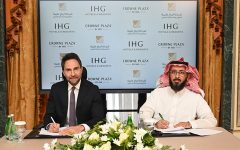 Nadia Ibrahim, Associate Director of Consultancy & Sustainability at leading UAE-based smart and green facilities management (FM) company Farnek, has revealed how all hotels throughout the region can create a bespoke roadmap to achieve Net Zero emissions by 2050.
Nadia Ibrahim, Associate Director of Consultancy & Sustainability at leading UAE-based smart and green facilities management (FM) company Farnek, has revealed how all hotels throughout the region can create a bespoke roadmap to achieve Net Zero emissions by 2050.
During her webinar presentation in conjunction with the Swiss Business Council, which was attended by key hospitality figures from across the region, Ibrahim highlighted the fact that some international hospitality brands may already have strategies in place to achieve their Net Zero ambitions.
However, many independent hotels, particularly three and four-star properties would require external support from consultants to design, plan and execute a carbon neutral roadmap.
“Major international hotel brands such as Accor, Hilton and Marriott have the necessary resources to achieve their sustainability goals, but many privately-owned independent hotels will not have the means to access dedicated internal support.
“There is also general confusion about what Net Zero means and the process and actions required to make a corporate commitment and how a hotel’s carbon footprint can be measured and reduced without affecting the operation or guest experience,” said Ibrahim.
It is widely reported that tourism and specifically hotels account for 8% and 1% respectively of total global carbon emissions. But implementing a carbon reduction plan is not an easy task, with multiple internal and external challenges. The most common of which are carbon footprint assessments across the hotel and its value chain, a lack of financial resources with little or no budget allocated for climate related activities, the higher costs associated with sustainable products and insufficient regulatory incentives to support a hotel’s Net Zero transition.
Ibrahim, who was elected to the board of the official Local Network of the UN Global Compact in the UAE earlier this year, also empahsised to delegates that despite the challenges, sustainability in hospitality is an undeniable trend which also affords operational savings, competitive advantage and strengthens relationships with stakeholders.
“Reducing energy output, water consumption and waste, will save a hotel operation money through lower utility bills and landfill costs. Moreover, 81% of travellers that responded to a 2021 booking.com survey said that they wanted to stay in sustainable accommodation and a further 49% claimed there was not enough choice,” said Ibrahim.
Leading by example, Farnek consultants have already identified the scope and boundaries, to accurately measure and reduce its own carbon footprint. Apart from building performance, such as energy and water consumption, Farnek is also taking into account employee travel, logistics, purchased goods and services, waste disposal, as well as focusing on recycling, renewables and other lower carbon alternatives.
“It is impossible to become carbon neutral by reduction methods alone, so hotels will need to offset a certain percentage of their emissions, by supporting certified carbon offset projects, such as providing clean cooking fuel to isolated communities in Africa to help prevent deforestation,” added Ibrahim.
Farnek has also developed an in-house, online solution called Hotel Optimizer which can carry out and benchmark complete energy, water and waste audits for hotel owners and managers.
Furthermore, Farnek is the preferred partner in the Middle East for Green Globe Certification, the premier worldwide sustainability management system and certification for the hospitality, travel and tourism industry.
“It is essential that hotels start to plan their environmental strategy now if they are to play their part and support the overall Net Zero goals of their respective governments, particularly those in the UAE, who will host the COP 28 meeting in Abu Dhabi next year,” concluded Ibrahim.
Breaking News
- IHG Hotels & Resorts signs Crowne Plaza Madinah Al Haramain, expanding Premium Portfolio in Saudi Arabia’s Holy City
- Emirates boosts services to Dublin with a third daily flight
- Etihad Airways takes off to Al Alamein, opening a new gateway to Egypt’s Mediterranean Coast
- Gulf Air to add up to 18 Boeing 787 Dreamliners to its widebody fleet
- Visit Qatar, discover Qatar and Qatar Airways lead joint roadshow in Nigeria to boost leisure tourism to Doha
- Saudi Arabia Tops Global Ranking in Growth of International Tourism Receipts in Q1 2025
- Ethiopian Airlines launches a new passenger service to Abu Dhabi
- Turkish Airlines and Airlink have signed a codeshare agreement
- flyadeal named as number 1 On-Time Performance in Mid East, Africa Category by Cirium
- SAUDIA moves to orders with Amadeus Nevio to accelerate guest-centric travel
- Saudi Arabia achieves record growth in international visitor spending reaching SAR 49.4 Billion in Q1 2025
 Tourism Breaking News
Tourism Breaking News


